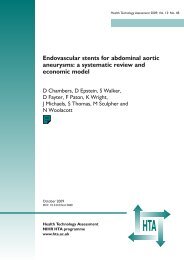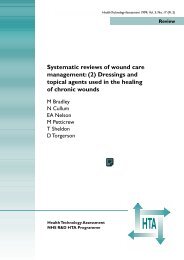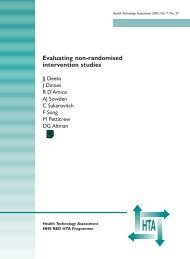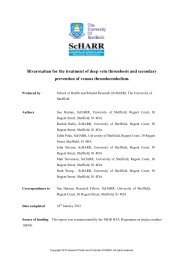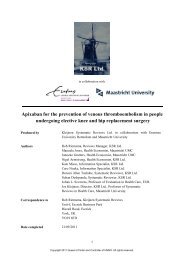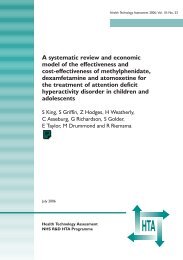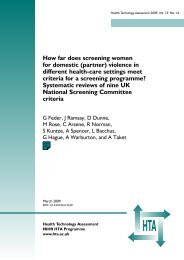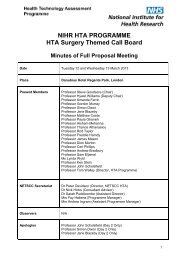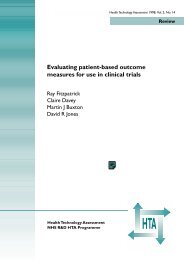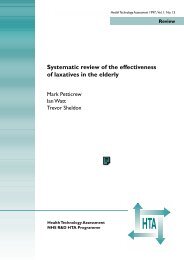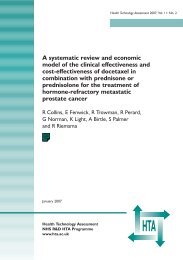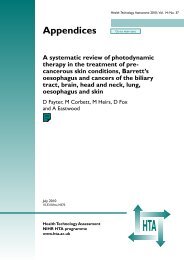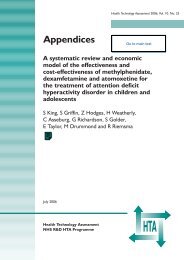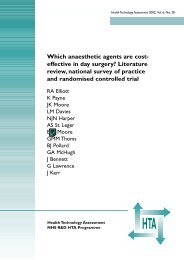Donepezil, rivastigmine, galantamine and memantine for ...
Donepezil, rivastigmine, galantamine and memantine for ...
Donepezil, rivastigmine, galantamine and memantine for ...
You also want an ePaper? Increase the reach of your titles
YUMPU automatically turns print PDFs into web optimized ePapers that Google loves.
106<br />
Economic analysis<br />
independent, (b) initially moderately severe <strong>and</strong><br />
dependent, (c) initially severe <strong>and</strong> independent <strong>and</strong><br />
(d) initially severe <strong>and</strong> dependent. In the first three<br />
of these subgroups improvements in clinical effect<br />
<strong>and</strong> cost savings were greater than the base-case<br />
analysis. In group (d), <strong>memantine</strong> was associated<br />
with an improvement of 0.02 year (7 days) in time<br />
spent in an independent state, a delay of 0.04 year<br />
(14 days) be<strong>for</strong>e institutionalisation, an increase of<br />
0.01 QALY <strong>and</strong> an incremental cost of £42 over<br />
2 years.<br />
Sensitivity analysis is reported in relation to<br />
duration of treatment <strong>and</strong> efficacy. The worst case<br />
scenario is presented as an improvement of<br />
0.07 year in time spent in an independent state,<br />
0.04 year in the community, <strong>and</strong> additional 0.03<br />
QALYs <strong>and</strong> cost savings of –£529.<br />
Industry submission on costeffectiveness<br />
of <strong>memantine</strong><br />
In their submission to the NICE technology<br />
appraisal process, the manufacturer of <strong>memantine</strong><br />
(H. Lundbeck) presents CEA <strong>for</strong> <strong>memantine</strong><br />
compared with usual care (no AD pharmacological<br />
treatment), <strong>and</strong> cost-effectiveness of <strong>memantine</strong><br />
when added to the management of patients<br />
stabilised on donepezil, compared with the use of<br />
donepezil alone, in moderately severe to severe<br />
AD patients. Their submission contains CEA on<br />
<strong>memantine</strong> versus no pharmacological therapy<br />
based on the study by Jones <strong>and</strong> colleagues, 104<br />
which is discussed above (although further detail is<br />
provided on methods <strong>and</strong> findings). Furthermore,<br />
the manufacturer’s submission presents separate<br />
CEA on the comparison of <strong>memantine</strong> in<br />
combination with donepezil versus donepezil alone.<br />
Presentation of the cost-effectiveness of<br />
<strong>memantine</strong> versus no pharmacological therapy<br />
largely follows the data presented above from the<br />
study by Jones <strong>and</strong> colleagues, although there are<br />
some small differences present in the<br />
manufacturer’s submission. The submission<br />
reports results at base-case scenario as an<br />
incremental QALY gain of 0.04 <strong>and</strong> a mean cost<br />
reduction per patient of £1960, suggesting<br />
<strong>memantine</strong> as a cost-effective <strong>and</strong> cost-saving<br />
treatment. Cost savings were reported across a<br />
range of cost categories with most areas reported<br />
as having small differences (in absolute terms), yet<br />
hospitalisation <strong>and</strong> institutionalisation costs were<br />
reduced by £2530 <strong>and</strong> £1149, respectively (shifts<br />
of –7.2 <strong>and</strong> –4.5%).<br />
Subgroup analysis <strong>for</strong> <strong>memantine</strong> versus no<br />
pharmacological therapy reported <strong>memantine</strong> as<br />
cost saving in all patient groups except those who<br />
were severe <strong>and</strong> dependent AD patients, where the<br />
mean cost per QALY was £4200 (0.01 QALY, <strong>and</strong><br />
an additional £42). One-way sensitivity analysis on<br />
key parameters showed the effect of <strong>memantine</strong><br />
on costs <strong>and</strong> QALYs decreased with decreasing<br />
effects on dependency, but remained in favour of<br />
<strong>memantine</strong> (additional benefits, cost savings).<br />
Memantine in combination with donepezil, versus<br />
donepezil alone<br />
Cost-effectiveness of <strong>memantine</strong> in combination<br />
with donepezil was estimated by the manufacturer<br />
using clinical data from the US study MEM-MD-<br />
02. 74<br />
[Commercial/academic confidential in<strong>for</strong>mation<br />
removed]<br />
Comments on industry submission <strong>for</strong><br />
<strong>memantine</strong><br />
The industry submission is based on a state<br />
transition model, describing disease states by<br />
severity, dependency <strong>and</strong> location, <strong>and</strong> this is a<br />
reasonable attempt to describe disease progression<br />
in the more severely affected AD patient group,<br />
where severity alone is not sufficient to<br />
differentiate between patient groups. The time<br />
horizon of 2 years seems appropriate, with<br />
6-monthly cycles used to fit clinical data (see<br />
Appendix 15 <strong>for</strong> an outline review of the model).<br />
However, transition probabilities used to model<br />
disease progression are from a combination of<br />
observational data <strong>and</strong> clinical trial data, with<br />
concerns over both in the context of the current<br />
UK analysis. Baseline <strong>and</strong> <strong>memantine</strong> transit<br />
probabilities <strong>for</strong> severity are from the clinical trial<br />
by Reisberg <strong>and</strong> colleagues, 72 a 6-month RCT<br />
(n = 252) (see Chapter 4). This trial reports a<br />
statistically significant difference of 2.1 points on<br />
the ADCS/ADL (functional outcomes), a nonstatistically<br />
significant difference on CIBIC-plus, a<br />
statistically significant difference on scores <strong>for</strong> the<br />
SIB, no statistically significant difference on<br />
MMSE, behaviour <strong>and</strong> mood (NPI) or the GDS,<br />
yet transit probabilities show substantive<br />
differences between <strong>memantine</strong> <strong>and</strong> placebo. For<br />
example, with usual care (placebo) there is a<br />
45.2% probability of transiting from moderately<br />
severe to severe over a 6-month cycle, whereas<br />
with <strong>memantine</strong> this probability is stated to be<br />
22% (a difference of 23%). The power of the<br />
clinical trial to drive such differences in the<br />
disease progression model must be questioned.<br />
Transit probabilities by dependency are cited from<br />
the LASER-AD Study 146 <strong>and</strong> the RCT from



